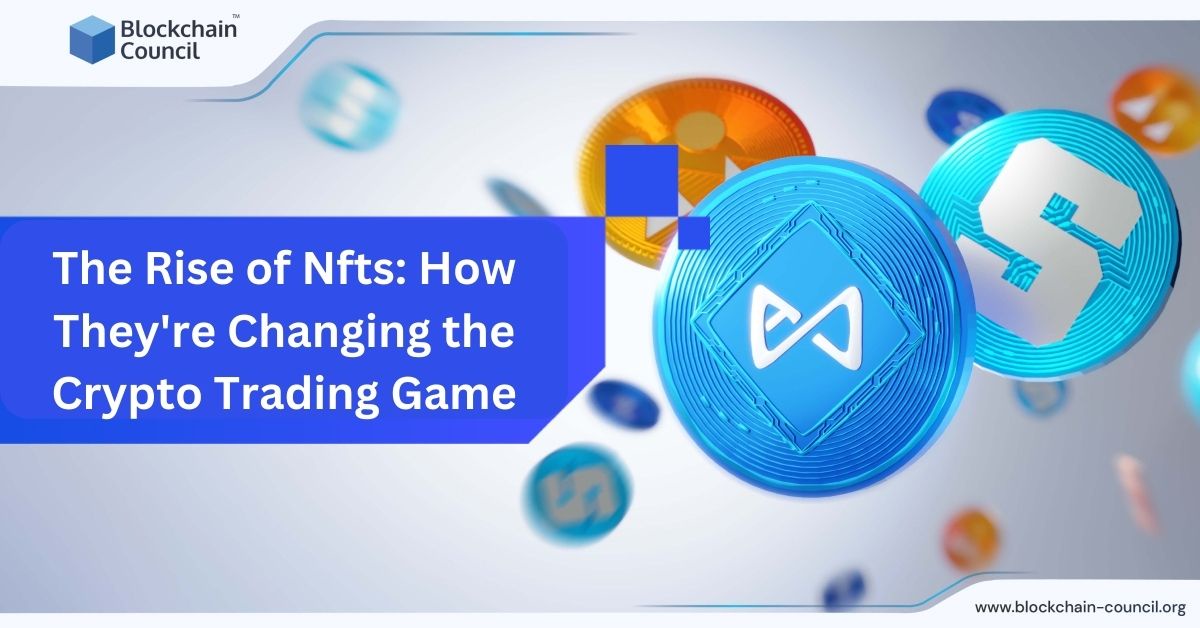Over the last few years, the world of cryptocurrencies has been rapidly evolving. With the recent success of NFT games such as Axie Infinity and Gods Unchained, the gaming industry has been forced to reconsider play-to-earn games as a valid entry into the medium. The crypto business has witnessed no shortage of innovation, from the debut of Bitcoin in 2009 to the proliferation of new cryptocurrencies and decentralized finance (DeFi) apps. The development of Non-Fungible Tokens (NFTs), which are transforming the way people think about crypto trading and ownership, is one of the most recent phenomena to arise.
What exactly is NFT crypto?
By now everyone is aware that crypto NFT is digital tokens that indicate ownership of a one-of-a-kind asset or piece of content, such as artwork, music, or video game items. Unlike typical cryptocurrencies such as Bitcoin or Ethereum, which are fungible (meaning each unit can be traded for another), NFTs are one-of-a-kind and cannot be reproduced or exchanged for another NFT. Therefore, in the digital realm, NFTs may be applied to symbolize holdings in one-of-a-kind goods.
NFTs have been operating for quite a few years, but it wasn't until later that they began to garner widespread notice. An NFT by digital artist Beeple sold for $69 million at a Christie's auction in March 2021, marking a watershed moment in the realm of digital art and NFTs. Since then, there has been a frenzy of activity in the NFT sector, with an increasing number of artists, musicians, and producers becoming engaged.
Why are NFTs becoming so famous?
There are several causes for this. For starters, artists have an interest in NFTs because they provide a mechanism to sell art that would otherwise be difficult to sell. Also, NFTs have a characteristic that the creator may activate that pays back a percentage every time the NFT is sold or transferred, ensuring that if an artist's recognition and market value skyrockets, they will reap some of the benefits.
They provide a new method for producers to monetize their digital material. NFT trade cards, like real-life trading cards, are valued based on their rarity, function, and certification. It used to be difficult for artists and musicians to generate money online since it was so easy for consumers to download or distribute their work for free. However, with NFTs, creators can sell one-of-a-kind versions of their work that cannot be replicated or shared without permission. This has created a new universe of opportunities for digital producers, who may now make substantial money from their work.
Another reason for the rise of NFTs is their potential as a new investment opportunity. As with any new asset class, there is always the potential for investors to make a profit by buying and selling NFTs at the right time. In fact, some people have already made significant profits by investing in NFTs early on. Of course, as with any investment, risks are involved, and it's important to research and understand the market before investing.
Also, NFT certification courses from recognized institutions are gaining much popularity. For instance, the Blockchain Council is a well-known institution that provides credentials in several blockchain-related sectors, including NFTs. These certifications are intended to assist individuals and organizations in acquiring the knowledge and skills required to deal with NFTs and other blockchain-based assets. An NFT certification from the Blockchain Council can help you get there, whether you're a programmer wishing to deepen your understanding of NFT development or an artist hoping to commercialize your digital creations.
Finally, NFTs are also appealing to collectors and enthusiasts who are interested in owning unique, one-of-a-kind items. Just as people collect rare stamps, coins, or baseball cards, there is now a growing market for collectible NFTs. These can range from digital art pieces to virtual real estate to in-game items and beyond. For collectors, owning an NFT can be a way to show off their taste and appreciation for a particular creator or piece of content.
How do NFTs actually work?
At their core, NFTs are built on blockchain technology, which is the same underlying technology that powers cryptocurrencies like Bitcoin and Ethereum. Each NFT is created as a unique digital asset and is assigned a specific identifier that is stored on the blockchain. This identifier acts as a digital certificate of ownership, proving that the owner of the NFT is the rightful owner of the underlying asset.
To create an NFT, a creator first needs to decide what they want to represent as a unique digital asset. This could be a piece of artwork, a song, a video game item, or anything else that can be represented digitally. Once the creator has created the digital asset, they can then "mint" an NFT, which assigns a unique identifier to the asset and creates a smart contract on the blockchain. This smart contract includes all the details of the NFT, including the owner's information, the unique identifier, and any other information related to the asset.
Once the NFT has been minted, it can then be sold or traded on an NFT marketplace. These marketplaces allow creators to sell their NFTs directly to buyers, who can then trade or sell the NFTs themselves. Some of the most popular NFT marketplaces include OpenSea, SuperRare, and Nifty Gateway.
When someone purchases an NFT, they are essentially buying the right to claim ownership of the unique digital asset represented by the NFT. This ownership can be transferred, just like any other asset, by transferring the ownership of the NFT itself. This is all recorded on the blockchain, making it transparent and immutable.
Of course, as with any new technology, there are still many questions and uncertainties around NFTs. For one, there are concerns about the environmental impact of NFTs, as the process of minting an NFT requires significant computing power and energy. Some people have also raised questions about the value of NFTs and whether they are a sustainable investment in the long run.
Despite these concerns, however, it's clear that NFTs are here to stay. They offer a new way for creators to monetize their work, a new investment opportunity for savvy investors, and a new way for collectors to own unique digital assets. As the NFT market continues to mature and evolve, it will be interesting to see what new possibilities and opportunities emerge.
What’s Next for NFTs?
As the concept of play-to-earn gaming gains popularity, it's no surprise that more and more industries are exploring the potential of NFTs. Among the most promising are fantasy sports and fantasy finance, which offer exciting opportunities to blend NFTs with traditional, real-world activities.
Imagine a world where those baseball cards you collected as a kid could suddenly skyrocket in value after a player has a great game, or when the market heats up for players from a championship-winning team. With NFTs, this could become a reality, adding an entirely new layer of excitement to fantasy sports.
But perhaps the most intriguing possibilities lie in the world of fantasy finance. Imagine a completely decentralized market for company stocks, where users, rather than companies, own and control the market. NFTs could revolutionize what it means to invest in the stock market, by eliminating the central hub and spreading the market among a much wider pool of users.
In this new model, fantasy trading of NFT stocks could become the norm, with users able to buy and sell stocks in a completely decentralized and transparent marketplace. This would not only democratize the stock market but also create exciting new investment opportunities for people around the world.
Conclusion
NFTs are revolutionizing the world of digital ownership and trading by providing a way for creators to monetize their digital content, offering a new investment opportunity, and appealing to collectors and enthusiasts. Built on blockchain technology, each NFT represents a unique digital asset and is assigned a specific identifier that acts as a digital certificate of ownership.
While there are still concerns about the environmental impact and uncertainties around NFTs, their potential to transform the way we think about ownership and value in the digital realm is undeniable. As the world of cryptocurrencies continues to evolve, it will be interesting to see how NFTs continue to change the game.


No comments yet